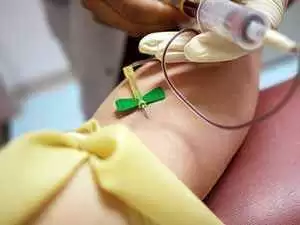Celiac.com 02/04/2013 - Ever wonder what happens to all those celiac disease patients who volunteer to do a gluten-challenge in the name of science? Well, the short answer is that they likely suffer, and may incur gut damage, at least in the short term.
 A team of researchers looking for ways to reduce or eliminate that problem recently conducted a study using larazotide acetate, a first-in-class oral peptide that prevents tight junction opening, and may reduce gluten uptake and associated problems.
A team of researchers looking for ways to reduce or eliminate that problem recently conducted a study using larazotide acetate, a first-in-class oral peptide that prevents tight junction opening, and may reduce gluten uptake and associated problems.
Celiac.com Sponsor (A12):
The research team included C. P. Kelly, P. H. R. Green, J. A. Murray, A. DiMarino, A. Colatrella, D. A. Leffler, T. Alexander, R. Arsenescu, F. Leon, J. G. Jiang, L. A. Arterburner, B. M. Paterson, R. N. and Fedorak. They are affiliated with the Celiac Center of Beth Israel Deaconess Medical Center at Harvard Medical School in Boston, the Celiac Disease Center at Columbia University in New York, NY, the Division of Gastroenterology and Hepatology at the Mayo Clinic in Rochester, MN, Thomas Jefferson University Hospital in Philadelphia, PA, the Pittsburgh Gastroenterology Associates in Pittsburgh, PA, with Gastrointestinal Specialists of Troy, MI, the Department of Internal Medicine at the University of Kentucky, in Lexington, KY, with Alba Therapeutics Corporation in Baltimore, MD, and with the Division of Gastroenterology at the University of Alberta in Edmonton, AB.
The team wanted to find out how well larazotide acetate worked and how well it was tolerated by celiac disease patients undergoing a gluten challenge.
To do this, the team conducted an exploratory, double-blind, randomized, placebo-controlled study that included 184 patients who maintained a gluten-free diet before and during the study.
After a gluten-free diet run-in, the team randomly divided patients into groups and gave them either larazotide acetate in doses of 1, 4, or 8 mg three times daily, or a placebo. Both groups also received 2.7 grams of gluten daily for six weeks.
The team then assessed ratios of lactulose-to-mannitol (LAMA), an experimental biomarker of intestinal permeability, and measured clinical symptoms by Gastrointestinal Symptom Rating Scale (GSRS) and anti-transglutaminase antibody levels.
They found no significant differences in LAMA ratios between larazotide acetate and placebo groups. Larazotide acetate 1-mg limited gluten-induced symptoms measured by GSRS (P = 0.002 vs. placebo).
They did find that the average ratio of anti-tissue transglutaminase IgA levels was 19.0 over baseline in the placebo group compared with 5.78 (P = 0.010) in the 1mg larazotide acetate group, 3.88 (P = 0.005) in the 4mg larazotide acetate group, and 7.72 (P = 0.025) in the 8mg larazotide acetate group.
Both the larazotide acetate and placebo groups showed similar rates of "adverse events."
Overall, the team found that larazotide acetate reduced gluten-induced immune reactivity and symptoms in celiac disease patients undergoing gluten challenge and was generally well tolerated.
However, the team found no significant difference in LAMA ratios between the larazotide acetate and placebo groups.
Even though they did not find anything revolutionary, the results and design of their study will likely be helpful in shaping future gluten-challenge studies in patients with celiac disease.
Source:
- Open Original Shared Link






Recommended Comments